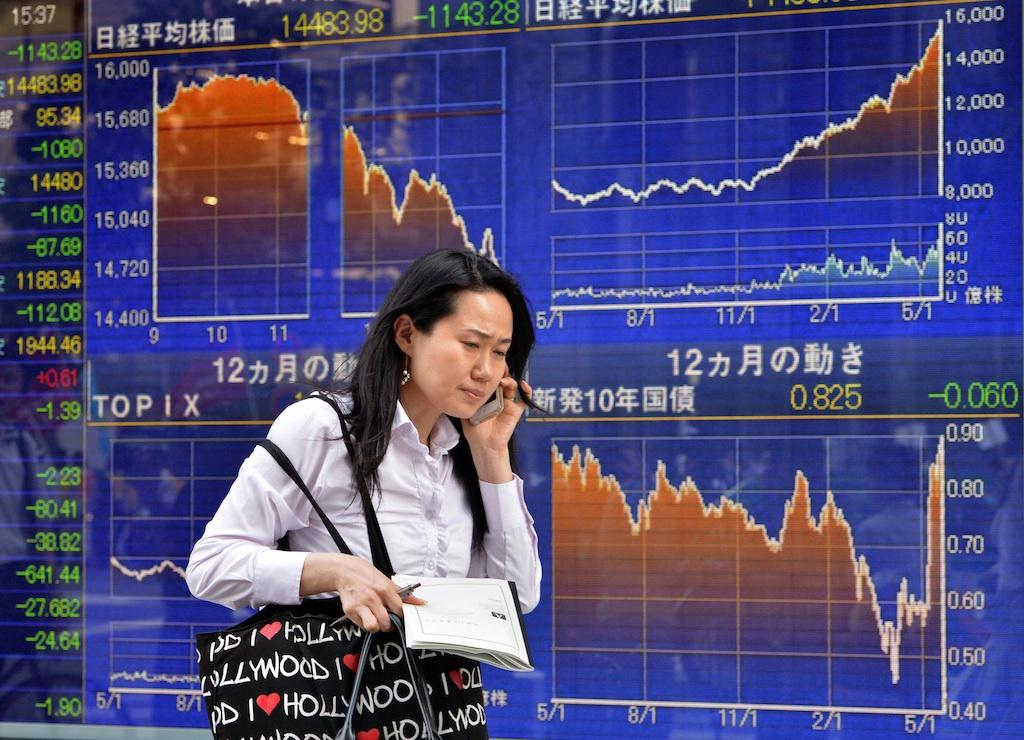What was behind plunge in Japanese stocks, which triggered falls across global markets?
A woman walks past a share prices board in Tokyo on May 23, 2013, the day the Nikkei 225 plunged more than 7 percent.
At least one trader described it as the “perfect storm” — an unexpected contraction in Chinese manufacturing activity and concerns about when the Federal Reserve might start scaling back its stimulus program.
Japanese stocks plunged more than 7 percent on Thursday — the biggest drop since the Fukushima nuclear disaster in 2011 — precipitating falls across global markets as nervous investors rushed for the exits.
But the market dip appears to be partly the result of factors outside the realm of Japan's stimulus drive. Investors may be nervous about China's coming export numbers. BBC also reports that investor fears over a rise in interest rates may have contributed to the sell-off, which would increase the cost of borrowing.
Traders cited two reason for the heavy selling.
HSBC released data Thursday showing factory output in China, the world’s second largest economy and key driver of global economic growth, contracted in May for the first time in seven months.
Fed Chairman Ben Bernanke also rattled markets with his testimony to Congress on Wednesday.
Bernanke said the Fed could soon start to “step down” bond purchases while warning that applying the brakes to the stimulus program too early could endanger the US economic recovery. His comments left investors scratching their heads about the Fed's plans and many erred on the side of caution.
“We got the perfect storm for risky assets, with negative signals from both monetary policy and macro-fundamentals,” Witold Bahrke, a senior strategist at PFA Pension A/S in Copenhagen, told Bloomberg News.
“Quantitative-easing fears got boosted yesterday, which can have quite an effect in an extremely central-bank manipulated market.”
Japan's benchmark Nikkei 225, which has surged more than 70 percent in the last 12 months on the Bank of Japan’s aggressive stimulus program, dived 7.32% to 14,483.98 following a rise in borrowing costs and the weak Chinese manufacturing data. China is a key buyer of Japanese exports.
The stock market fluctuation followed erratic but steady improvement over the past six months, which analysts largely attribute to confidence in Prime Minister's Abe's economic stimulus following two decades of economic doldrums.
Japanese Economy Minister Akira Amari sought to calm investors after the market closed, the New York Times reported.
“The Japanese economy is staging a sound recovery, and there is no need for panic,” he said.
The fall “is not exceedingly large, and stock prices in China, where the shock originated, have not fallen so much either.”
Elsewhere, trading screens in the United States, Europe, Asia and Latin America were awash in red as markets retreated in response to the sharp fall in Japan and the mixed-messages from the Fed.
By Friday morning, the Nikkei Stock Average was up about 2.5 percent, showing a slight recovery from Thursday's plunge.
More from GlobalPost: Japan's Nikkei rebounds after Thursday plunge
Geoffrey Cain in Seoul contributed to this report.
